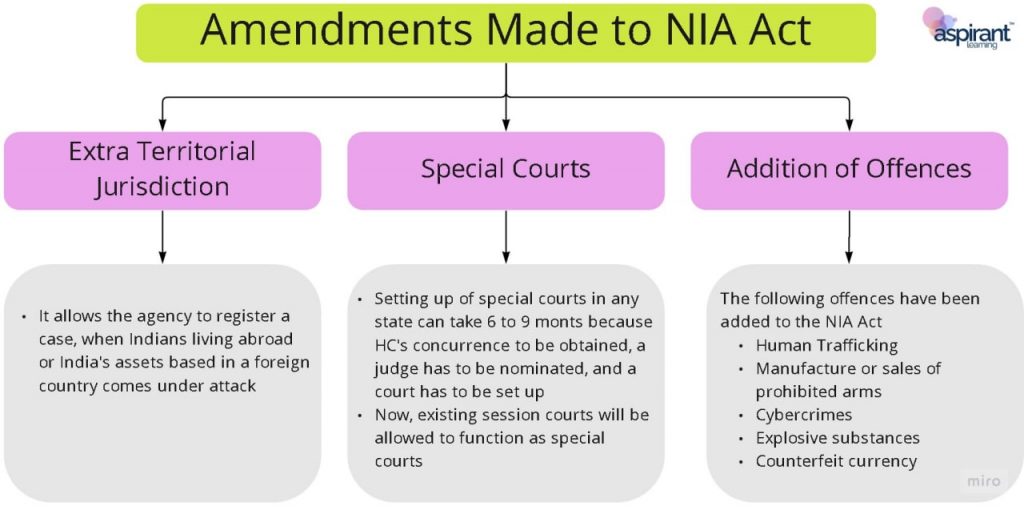News Highlights
The National Investigation Agency (NIA) has taken over the probe into the killing of a tailor in Rajasthan’s Udaipur
National Investigation Agency
- The National Investigation Agency (NIA) is the primary counter-terrorist task force in India.
- Formation – By National Investigation Agency (NIA) Act, 2008. (a statutory body)
- Ministry – Ministry of Home Affairs.
- Headquarters – New Delhi
- Regional Offices – Hyderabad, Guwahati, Kochi, Lucknow, Mumbai, Kolkata, Raipur, and Jammu.
Origin of NIA
- For the past few years, India is witnessing a number of terror acts that causing huge security threats to India.
- By considering this issue several recommendations are put forwards by the various committees and one notable recommendation is the Administrative Reforms commission
- Following the 26/11 terrorist attacks in Mumbai, it was introduced by the then-home minister and passed in Parliament with little resistance.
- As a result, on December 31, 2008, the NIA Act was passed, and the National Investigation Agency (NIA) was established.
Aim of NIA
- It aims to be a highly competent investigation organisation that meets the highest standards around the world.
- By creating a highly-skilled, team-oriented workforce, the NIA hopes to establish the benchmarks for excellence in counterterrorism and other national security-related investigations at the national level.
- It seeks to counter current and potentially terrorist organizations and individuals.
- It aims to become a repository for all data relating to terrorism.
Composition of NIA
- Officers of the NIA are also deputed from the Indian Police Service and the Indian Revenue Service.
Functions of NIA
- It investigates the offences related to
- Affects India’s sovereignty, security, and integrity as well as state security and good relations with other countries.
- Against nuclear and atomic power plants.
- Smuggling in High-Quality Counterfeit Indian Currency.
- It puts into effect the conventions, treaties, and resolutions of other international organisations as well as the United Nations and its agencies.
- It acts as the Central Counter-Terrorism Law Enforcement Agency.
Mandate of NIA
- In accordance with section VI of the NIA Act, 2008, the cases are given to the NIA by the Central Government.
- The Agency independently conducts the case investigations.
- The NIA Special Court hears the cases after an inquiry.
- The Agency requests permission from the Central Government to prosecute the accused under the Unlawful Activities (Prevention) Act of 1967 (UAPA) and a few other listed offences.
- It has the authority to handle terrorism-related offenses in all states without the states’ consent.
Special Court of NIA
- In accordance with Sections 11 and 22 of the NIA Act 2008, the Central Government establishes one or more Special Courts for the trial of Scheduled Offences.
- Composition – A judge to be selected by the Central Government on the suggestion of the Chief Justice of the concerned High Court would preside over the Special Court.
- On the proposal of the Chief Justice of the High Court, the Central Government may, if necessary, appoint one or more additional judges to the Special Court.
NIA Amendment Act, 2019

Critics About Amendment Act
- The maintenance of public order and the operation of police forces are considered matters of state under schedule VII of the Constitution.
- Criminal law is included in the concurrent list, whereas national security is listed within the union list’s domains.
Content Source: The Hindu



